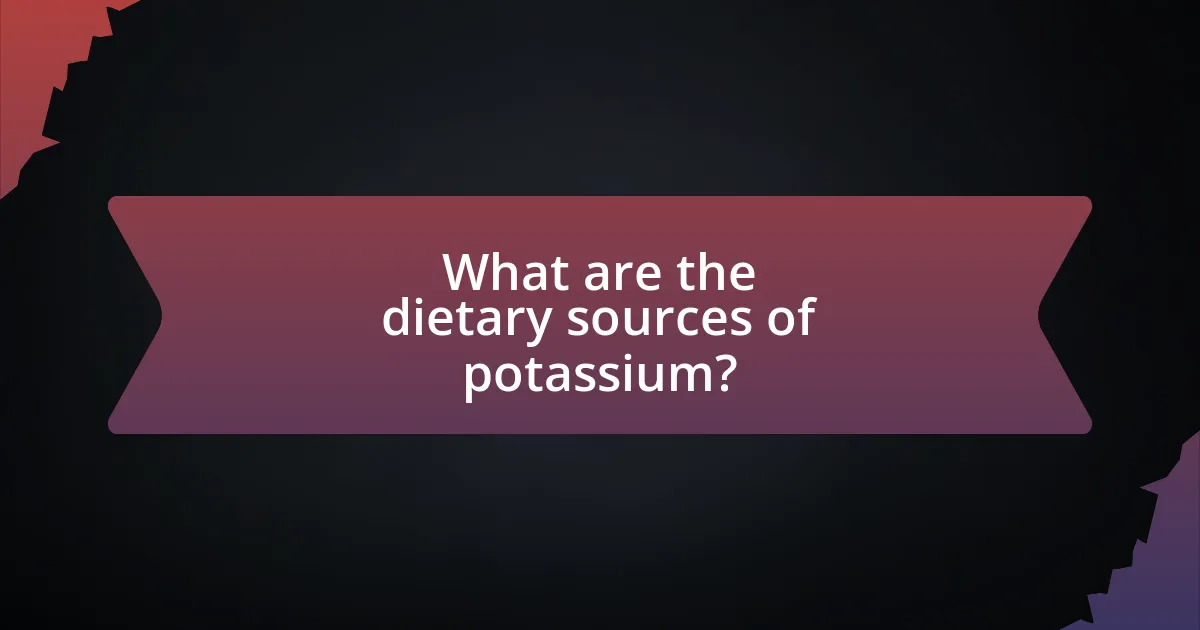Potassium is a vital mineral that plays a significant role in heart function by regulating heart rhythm and maintaining proper electrical activity in cardiac cells. Adequate potassium levels are essential for preventing arrhythmias and controlling blood pressure, thereby reducing the risk of stroke and cardiovascular disease. The article explores the physiological mechanisms of potassium in the heart, the consequences of potassium deficiency, dietary sources of potassium, and practical tips for maintaining healthy potassium levels. It emphasizes the importance of potassium in promoting cardiovascular health and preventing heart-related complications.

What is the role of potassium in heart function?
Potassium plays a crucial role in heart function by regulating heart rhythm and maintaining proper electrical activity in cardiac cells. This mineral is essential for the generation and conduction of electrical impulses that trigger heartbeats, ensuring the heart contracts and relaxes effectively. Research indicates that adequate potassium levels help prevent arrhythmias, which are irregular heartbeats that can lead to serious complications. For instance, a study published in the American Journal of Clinical Nutrition found that higher potassium intake is associated with a reduced risk of stroke and cardiovascular disease, highlighting its protective effects on heart health.
How does potassium contribute to heart health?
Potassium contributes to heart health by regulating heart rhythm and maintaining proper blood pressure levels. This essential mineral helps to balance sodium levels in the body, which is crucial for preventing hypertension. Research indicates that adequate potassium intake is associated with a reduced risk of stroke and cardiovascular disease. For instance, a study published in the American Journal of Clinical Nutrition found that higher potassium consumption is linked to lower blood pressure and improved cardiovascular outcomes.
What are the physiological mechanisms of potassium in the heart?
Potassium plays a crucial role in the physiological mechanisms of the heart by regulating cardiac excitability, conduction, and contractility. It maintains the resting membrane potential of cardiac cells, which is essential for the generation and propagation of action potentials. The concentration of potassium ions influences the repolarization phase of the cardiac action potential, thereby affecting heart rhythm and rate.
Specifically, potassium ions are involved in the function of ion channels, such as the voltage-gated potassium channels, which facilitate the outflow of potassium during repolarization. This process is vital for returning the cardiac cells to their resting state after each heartbeat. Abnormal potassium levels can lead to arrhythmias, as evidenced by studies showing that hyperkalemia can cause cardiac arrest due to impaired conduction and depolarization. Conversely, hypokalemia can lead to increased cardiac excitability and arrhythmias, highlighting the importance of potassium homeostasis in maintaining normal heart function.
How does potassium influence heart rhythm and contraction?
Potassium is essential for maintaining normal heart rhythm and contraction. It regulates the electrical activity of the heart by influencing the resting membrane potential and action potentials of cardiac cells. High levels of potassium facilitate repolarization, which is crucial for the heart’s ability to reset after each contraction, while low levels can lead to arrhythmias and impaired contraction strength. Studies have shown that potassium levels directly correlate with heart function; for instance, hypokalemia (low potassium) is associated with increased risk of cardiac arrhythmias, as evidenced by research published in the Journal of the American College of Cardiology, which highlights the critical role of potassium in cardiac electrophysiology.
Why is potassium essential for cardiovascular health?
Potassium is essential for cardiovascular health because it helps regulate blood pressure and maintain proper heart function. This mineral aids in balancing sodium levels in the body, which is crucial for controlling blood pressure; high sodium levels can lead to hypertension. Studies have shown that adequate potassium intake is associated with a reduced risk of stroke and heart disease. For instance, research published in the American Journal of Clinical Nutrition found that higher potassium intake correlates with lower blood pressure levels, supporting its role in cardiovascular health.
What are the consequences of potassium deficiency on heart function?
Potassium deficiency can lead to significant consequences on heart function, including arrhythmias, increased blood pressure, and impaired cardiac contractility. Low potassium levels disrupt the electrical signals that regulate heartbeats, which can result in irregular heart rhythms, known as arrhythmias. Additionally, potassium plays a crucial role in maintaining normal blood pressure; deficiency can lead to hypertension. Studies have shown that adequate potassium intake is associated with lower blood pressure levels, highlighting its importance in cardiovascular health. Furthermore, potassium is essential for proper muscle contraction, including the heart muscle; insufficient levels can weaken the heart’s ability to pump effectively, potentially leading to heart failure.
How does adequate potassium intake prevent heart disease?
Adequate potassium intake prevents heart disease by regulating blood pressure and maintaining proper heart function. Potassium helps balance sodium levels in the body, which is crucial for controlling blood pressure; high blood pressure is a significant risk factor for heart disease. Studies indicate that individuals with higher potassium intake have lower blood pressure levels, which reduces the risk of cardiovascular events. For instance, a meta-analysis published in the American Journal of Hypertension found that increasing potassium intake by 1,000 mg per day was associated with a reduction in systolic blood pressure by approximately 4.4 mm Hg. This evidence supports the role of potassium in promoting heart health and preventing heart disease.

What are the dietary sources of potassium?
Dietary sources of potassium include fruits, vegetables, legumes, nuts, and dairy products. Bananas, oranges, potatoes, spinach, and avocados are particularly high in potassium, with a medium banana containing about 422 mg of potassium. Additionally, beans and lentils provide significant amounts, with one cup of cooked lentils offering approximately 731 mg. Dairy products like yogurt also contribute, with one cup containing around 573 mg. These foods are essential for maintaining proper heart function, as potassium helps regulate blood pressure and supports muscle contractions.
Which foods are rich in potassium?
Foods that are rich in potassium include bananas, sweet potatoes, spinach, avocados, and beans. Bananas contain approximately 422 mg of potassium per medium fruit, while a medium sweet potato provides about sweet potato provides about 438 mg. Spinach offers around 839 mg per cooked cup, avocados contain about 975 mg each, and beans, particularly white beans, can provide up to 1,189 mg per cup. These foods are essential for maintaining proper heart function, as potassium helps regulate blood pressure and supports overall cardiovascular health.
How can fruits and vegetables contribute to potassium intake?
Fruits and vegetables significantly contribute to potassium intake by being rich sources of this essential mineral. For instance, bananas, oranges, potatoes, spinach, and avocados are particularly high in potassium, with a medium banana containing about 422 mg of potassium and a medium baked potato providing approximately 926 mg. These foods help maintain proper electrolyte balance, support muscle function, and regulate blood pressure, which are crucial for heart health. The Dietary Guidelines for Americans recommend a potassium intake of 2,600 mg for women and 3,400 mg for men, emphasizing the role of fruits and vegetables in meeting these daily requirements.
What role do legumes and nuts play in potassium consumption?
Legumes and nuts are significant sources of potassium, contributing to overall potassium consumption essential for heart function. For instance, a 100-gram serving of cooked lentils contains approximately 369 mg of potassium, while almonds provide about 705 mg per 100 grams. These foods help maintain electrolyte balance, support muscle contractions, and regulate blood pressure, all crucial for cardiovascular health. The inclusion of legumes and nuts in the diet can therefore enhance potassium intake, promoting optimal heart function and reducing the risk of hypertension and related heart diseases.
How can potassium levels be monitored?
Potassium levels can be monitored through blood tests, which measure the concentration of potassium in the bloodstream. These tests are typically performed in a clinical setting, where a healthcare professional draws blood and sends it to a laboratory for analysis. Regular monitoring is crucial, especially for individuals with conditions that affect potassium balance, such as kidney disease or those on certain medications. The normal range for potassium in the blood is approximately 3.5 to 5.0 milliequivalents per liter (mEq/L), and deviations from this range can indicate potential health issues, including cardiac problems.
What tests are used to measure potassium levels in the body?
The primary test used to measure potassium levels in the body is the serum potassium test. This blood test quantifies the concentration of potassium in the bloodstream, which is crucial for various bodily functions, including heart function. Normal potassium levels typically range from 3.5 to 5.0 milliequivalents per liter (mEq/L). Abnormal levels can indicate conditions such as hyperkalemia or hypokalemia, which can significantly affect cardiac health.
How can individuals assess their potassium intake effectively?
Individuals can assess their potassium intake effectively by tracking their dietary consumption of potassium-rich foods and utilizing nutritional databases or apps to calculate their daily intake. The recommended daily intake of potassium for adults is approximately 2,500 to 3,000 milligrams, and individuals can compare their consumption against this guideline. Research indicates that many people do not meet these recommendations, which can lead to health issues, including cardiovascular problems. By maintaining a food diary and using tools like the USDA FoodData Central, individuals can accurately monitor their potassium levels and make necessary dietary adjustments.

What are the risks associated with potassium imbalance?
Potassium imbalance poses significant risks, primarily affecting heart function and muscle contractions. Low potassium levels, known as hypokalemia, can lead to arrhythmias, muscle weakness, and increased risk of hypertension. Conversely, high potassium levels, or hyperkalemia, can result in life-threatening cardiac arrest due to disrupted electrical signaling in the heart. Studies indicate that maintaining potassium levels within the normal range is crucial for preventing these severe complications, as evidenced by research published in the Journal of the American College of Cardiology, which highlights the correlation between potassium levels and cardiovascular health.
What are the symptoms of high potassium levels (hyperkalemia)?
The symptoms of high potassium levels, known as hyperkalemia, include muscle weakness, fatigue, palpitations, and in severe cases, cardiac arrest. Muscle weakness occurs due to the disruption of normal electrical activity in muscle cells, while fatigue can result from the overall impact on muscle function. Palpitations arise from irregular heart rhythms caused by elevated potassium levels affecting cardiac conduction. Severe hyperkalemia can lead to life-threatening conditions, such as cardiac arrest, as potassium plays a critical role in maintaining the heart’s electrical stability.
How can hyperkalemia affect heart function?
Hyperkalemia can significantly impair heart function by disrupting the normal electrical activity of the heart. Elevated potassium levels lead to changes in the resting membrane potential of cardiac cells, which can result in arrhythmias, decreased contractility, and potentially cardiac arrest. Studies indicate that hyperkalemia can cause a progressive increase in the duration of the QRS complex on an electrocardiogram, reflecting impaired conduction through the heart’s electrical system. This disruption can escalate to life-threatening conditions if not addressed promptly.
What are the potential causes of hyperkalemia?
Hyperkalemia is primarily caused by factors that disrupt potassium balance in the body. Common causes include renal failure, where the kidneys are unable to excrete potassium effectively, leading to its accumulation in the bloodstream. Other causes include excessive potassium intake from supplements or dietary sources, cellular breakdown due to trauma or hemolysis, and certain medications such as ACE inhibitors or potassium-sparing diuretics that impair potassium excretion. Additionally, conditions like adrenal insufficiency can reduce aldosterone production, further contributing to hyperkalemia.
What are the symptoms of low potassium levels (hypokalemia)?
The symptoms of low potassium levels, known as hypokalemia, include muscle weakness, fatigue, cramping, and irregular heart rhythms. These symptoms arise because potassium is essential for muscle function and maintaining normal heart rhythm. In severe cases, hypokalemia can lead to paralysis or life-threatening arrhythmias, highlighting the critical role potassium plays in cardiovascular health. Studies indicate that potassium levels below 3.5 mEq/L can result in these symptoms, emphasizing the importance of monitoring potassium for heart function.
How does hypokalemia impact heart health?
Hypokalemia negatively impacts heart health by causing arrhythmias and increasing the risk of cardiovascular complications. Low potassium levels disrupt the electrical signals that regulate heartbeats, leading to irregular heart rhythms, which can be life-threatening. Studies indicate that hypokalemia is associated with a higher incidence of cardiac events, including sudden cardiac arrest, particularly in individuals with pre-existing heart conditions. Maintaining adequate potassium levels is crucial for proper heart function, as potassium is essential for muscle contraction and nerve signaling.
What are the common causes of hypokalemia?
Common causes of hypokalemia include excessive loss of potassium through urine, gastrointestinal losses, and inadequate dietary intake. Diuretics, particularly loop and thiazide diuretics, can lead to increased urinary potassium excretion, resulting in hypokalemia. Gastrointestinal losses may occur due to vomiting, diarrhea, or laxative abuse, which can significantly deplete potassium levels. Additionally, conditions such as hyperaldosteronism can cause the kidneys to excrete too much potassium. According to the National Institutes of Health, hypokalemia can also arise from certain medications and chronic illnesses that affect potassium balance.
What practical tips can help maintain healthy potassium levels?
To maintain healthy potassium levels, individuals should consume potassium-rich foods such as bananas, oranges, potatoes, and spinach. These foods provide essential nutrients that help regulate blood pressure and support heart function. The recommended daily intake of potassium for adults is about 2,500 to 3,000 milligrams, and incorporating a variety of fruits and vegetables can help achieve this goal. Additionally, reducing sodium intake can enhance potassium’s effectiveness in managing blood pressure, as high sodium levels can lead to potassium depletion. Studies have shown that diets high in potassium can lower the risk of stroke and heart disease, reinforcing the importance of maintaining adequate potassium levels for cardiovascular health.
How can meal planning support adequate potassium intake?
Meal planning can support adequate potassium intake by ensuring the inclusion of potassium-rich foods in daily diets. By systematically organizing meals, individuals can prioritize foods such as bananas, sweet potatoes, spinach, and beans, which are known for their high potassium content. Research indicates that a diet rich in potassium can help lower blood pressure and reduce the risk of heart disease, highlighting the importance of consistent potassium consumption for heart function. For instance, the Dietary Guidelines for Americans recommend a daily potassium intake of about 2,500 to 3,000 mg for adults, which can be effectively achieved through thoughtful meal planning that incorporates a variety of fruits, vegetables, and whole grains.
What lifestyle changes can promote balanced potassium levels?
To promote balanced potassium levels, individuals should focus on a diet rich in potassium-containing foods, regular physical activity, and adequate hydration. Consuming foods such as bananas, oranges, spinach, and sweet potatoes can significantly increase potassium intake, as these foods are high in this essential mineral. Regular exercise helps maintain overall cardiovascular health and can support potassium balance by promoting proper cellular function. Additionally, staying well-hydrated aids in the regulation of potassium levels, as dehydration can lead to imbalances. Studies indicate that a diet high in fruits and vegetables, which are natural sources of potassium, is associated with lower blood pressure and improved heart health, reinforcing the importance of these lifestyle changes.





